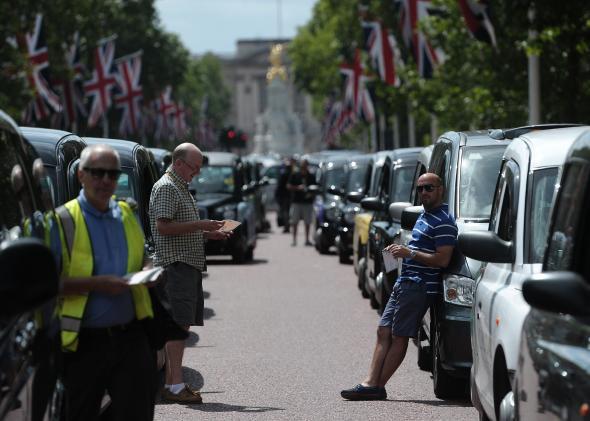It’s never been a better moment to describe Uber as “disruptive.” Traffic choked streets in major cities across Europe and stonewalled commutes on Wednesday as tens of thousands of taxi and limo drivers gathered to strike against Uber—and against a perceived failure by governments to regulate it as strictly as other metered car services. Drivers in London honked their horns and used their vehicles to blockade some of the city’s busiest streets. Protesters in Paris cut off access to the Charles de Gaulle and Orly airports. In Madrid, they heckled taxis that were staying out of the rallies. The standoff came less than a week after Uber made headlines for securing $1.2 billion in a latest funding round, hiking its valuation to a stunning $18.2 billion.
Taxicab drivers throughout Europe are calling for their governments to crack down on Uber with tougher regulations. London has emerged as the epicenter of the demonstrations: Thousands of drivers are rankled that the city’s public transit authority, Transport for London, or TfL, has determined that the smartphone app used by Uber drivers cannot be classified as a meter because it is not installed in the vehicle. That technical distinction is everything because TfL rules state that only licensed taxis can use a meter—a privilege that comes with strict regulatory hurdles. Drivers feel that because Uber’s app determines fare based on time and distance (and the occasional price surge), it functions like a de facto meter and should be regulated accordingly.
The issue is a complicated one. More competition and cars in the tightly controlled taxi industry is undoubtedly a good thing for customers. “In New York, lots of times, there aren’t enough cabs—there aren’t enough medallions and it’s expensive to get one,” says Joe Kott, a lecturer at Stanford’s urban studies program and expert in transportation planning. “So that creates a market niche and demand for services like Uber.” On the other hand, holding companies that essentially offer the same service to different regulatory standards is problematic. “We need more taxicab services, but we don’t need to have inequities in the system where some companies are more regulated than other companies,” Kott says.
Uber, in a brash move of its own, seized upon the widespread European gridlock as an opportunity to market its service. The company announced on Wednesday that it would extend its booking services to London’s iconic black cabs in exchange for a flat 5 percent commission on the ride. It purchased a full-page ad in evening papers to offer new customers £20 off their first trip. In Paris Uber offered customers 50 percent off on rides of €25 or less, and in Germany all rides were discounted 50 percent. By the end of the day Uber was reporting an 850 percent increase in new users in London.
Facing claims that it operates illegally in European cities, Uber has repeatedly said that it follows local rules and pays the appropriate taxes. While taxicab drivers are framing the dispute in terms of regulation, Uber prefers to see the demonstrations as a last effort to protect an establishment industry. “In Paris, the number of taxis hasn’t changed since the 1950s,” Pierre-Dimitri Gore-Coty, Uber’s regional general manager for northern Europe, told the New York Times. “The strikes are an attempt to desperately fight against competition in the market.”
What will come of the strikes remains to be seen. In London, TfL has referred the essential questions of the dispute—whether Uber’s operations are legal and whether its app constitutes a meter—to the high court. The French government has appointed a mediator to help resolve the issue. Uber has already been banned in Brussels and was barred from operating in Berlin a few months ago. The service is also forbidden in select cities in the U.S.
That said, Uber was also initially banned in New York City. Even there, where the taxicab industry wields a tremendous amount of power, the forces of the market turned out to be greater.
